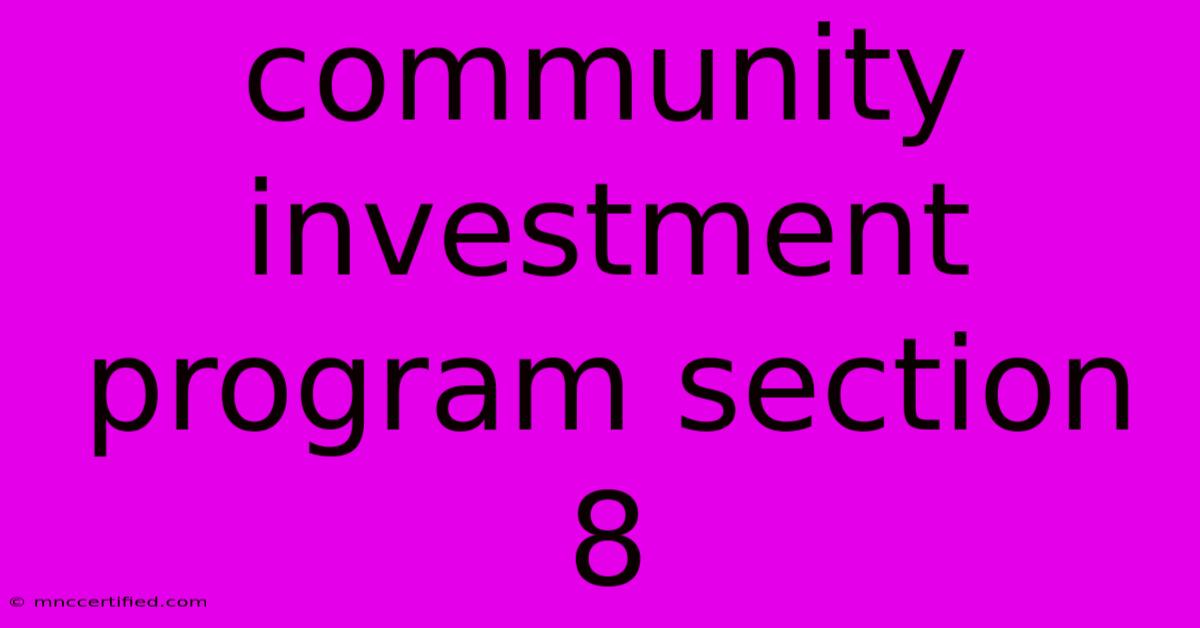Community Investment Program Section 8

Table of Contents
Investing in Communities: Understanding Section 8 and Community Investment Programs
The Section 8 Housing Choice Voucher Program is a vital component of affordable housing initiatives in the United States, offering assistance to low-income families and individuals seeking safe and decent housing. However, Section 8 is more than just a housing program; it's a powerful tool for community investment and revitalization. This article delves into the intersection of Section 8 and community investment programs, exploring how these initiatives work together to create vibrant and thriving neighborhoods.
How Section 8 Housing Works
The Section 8 program operates through Housing Choice Vouchers, providing financial assistance to eligible tenants, allowing them to rent privately owned units. Landlords participating in the program agree to accept vouchers and adhere to specific rental guidelines.
Here's a breakdown of how it works:
- Eligibility: Households meet income requirements and undergo a screening process to determine their eligibility for Section 8 assistance.
- Voucher Allocation: Upon approval, eligible households receive a voucher with a designated payment standard based on their location and family size.
- Unit Search: Voucher holders search for suitable rental units in the private market.
- Landlord Approval: Once a suitable unit is found, the landlord must agree to participate in the Section 8 program.
- Rental Assistance: The government pays a portion of the rent directly to the landlord, with the tenant responsible for the remaining balance.
Community Investment through Section 8
Section 8's impact extends beyond providing affordable housing. It plays a crucial role in community investment by:
- Stabilizing Neighborhoods: By supporting families in finding safe and affordable housing, Section 8 helps to stabilize neighborhoods and prevent displacement. This leads to increased community cohesion and reduces crime rates.
- Boosting Local Economies: Section 8 creates economic opportunities for local businesses, as voucher holders contribute to the local economy through their spending on groceries, transportation, and other services.
- Supporting Mixed-Income Communities: By encouraging diverse housing options, Section 8 promotes mixed-income communities, creating a more equitable and integrated society.
Community Investment Programs in Action
Several innovative community investment programs leverage Section 8 to drive positive change:
- Housing Choice Voucher Programs: These programs often provide financial assistance to landlords who make improvements to their properties, ensuring that Section 8 participants have access to high-quality, safe housing.
- Neighborhood Revitalization Initiatives: Section 8 funding is sometimes integrated into broader neighborhood revitalization efforts, aiming to improve infrastructure, attract businesses, and create vibrant public spaces.
- Homeownership Programs: In some areas, Section 8 funds are used to support programs that help voucher holders transition into homeownership, building equity and stability for themselves and their families.
Challenges and Opportunities
While Section 8 is a valuable tool for community investment, it also faces challenges:
- Funding Constraints: The program faces ongoing funding challenges, often leading to waitlists for vouchers and limited availability of subsidized housing.
- Stigma and Discrimination: Some landlords may be hesitant to accept Section 8 vouchers due to outdated stereotypes and misconceptions, limiting housing choices for voucher holders.
Addressing these challenges requires ongoing advocacy and collaboration between policymakers, community leaders, and housing providers.
Moving Forward: Building Stronger Communities Together
Section 8 housing plays a vital role in building strong and thriving communities. By fostering collaboration between government agencies, housing providers, and local communities, we can continue to expand access to affordable housing and leverage the power of Section 8 to create more equitable and vibrant neighborhoods for all.
This article is for informational purposes only and should not be considered legal advice. Consult with a housing expert or legal professional for specific guidance.

Thank you for visiting our website wich cover about Community Investment Program Section 8. We hope the information provided has been useful to you. Feel free to contact us if you have any questions or need further assistance. See you next time and dont miss to bookmark.
Featured Posts
-
Meet Susie Wiles Trumps New White House Chief
Nov 09, 2024
-
Fleet Insurance For Car Rental Company
Nov 09, 2024
-
Friday Night Football Expert Betting Tips
Nov 09, 2024
-
Hearts University Celebrate 150 Years With Plays
Nov 09, 2024
-
Wedding Insurance For Overseas Wedding
Nov 09, 2024